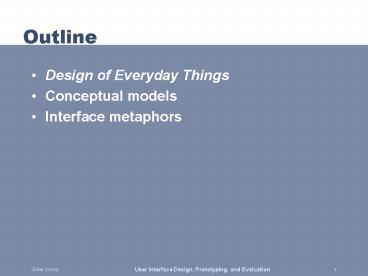Outline PowerPoint PPT Presentation
1 / 27
Title: Outline
1
Outline
- Design of Everyday Things
- Conceptual models
- Interface metaphors
2
Design of Everyday Things
- By Don Norman (UCSD, Apple, HP, NN Group)
- Design of everyday objects illustrates problems
faced by designers of systems - Explains conceptual models
- doors, washing machines,
digital watches, telephones, ... - Resulting design guides
- -gt Highly recommend this book
3
Conceptual Models
- Mental representation of how object works how
interface controls affect it - People may have preconceived models that are hard
to change - (4 5) vs. (4 5 )
- dragging to trash?
- delete file but eject disk
- Interface must communicate model
- visually
- online help and documentation can help,
but shouldnt be necessary
4
Affordances as Perceptual Clues
- Well-designed objects have affordances
- clues to their operation
- often visual, but not always (e.g., speech)
5
Affordances as Perceptual Clues
Siemens Pocket PC Phone Pen input, no keypad
Handspring Treo Pen input/keypad input
6
Affordances as Perceptual Clues
- Poorly-designed objects
- no clues or misleading clues
Crazy design for a screw punch!
7
Refrigerator
freezer
fresh food
- Problem freezer too cold, but fresh food just
right
8
Refrigerator Controls
Normal Settings C and 5 Colder Fresh Food C and
6-7 Coldest Fresh Food B and 8-9 Colder
Freezer D and 7-8 Warmer Fresh Food C and
4-1 OFF (both) 0
- What is your conceptual model?
9
A Common Conceptual Model
cooling unit
cooling unit
- independent controls
10
Actual Conceptual Model
cooling unit
- Now can you fix the problem?
- Possible solutions
- make controls map to users model
- make controls map to actual system
11
Design Model User Model
- Users get model from experience usage
- through system image
- What if the two models dont match?
12
Conceptual Model Mismatch
- Mismatch between designers users conceptual
models leads to - Slow performance
- Errors
- Frustration
- ...
13
Notorious Example
14
Personal Example
15
Design Guides
- Provide good conceptual model
- user wants to understand how UI controls impact
object - Make things visible
- if object has function, interface should show it
- Map interface controls to users model
- infix vs. postfix calculator -- whose model?
- Provide feedback
- what you see is what you get!
16
Make Things Visible
- Refrigerator (?)
- make the A..E dial something about percentage of
cooling between the two compartments? - Controls available on watch w/ 3 buttons?
- too many and they are not visible!
- Compare to controls on simple car radio
- controls functions
- controls are labeled (?) and grouped together
17
Map Interface Controls
- Control should mirror real-world
- Which is better for dashboard speaker front /
back control?
18
Map Interface Controls
19
Map Interface Controls
20
Metaphor
- Definition ?
- The transference of the relation between one
set of objects to another set for the purpose of
brief explanation. - Lakoff Johnson, Metaphors We Live By
- ...the way we think, what we experience, and
what we do every day is very much a matter of
metaphor. - We can use metaphors to leverage existing
conceptual models
21
Desktop Metaphor
- Suggests a conceptual model
- Not really an attempt to simulate a real desktop
- Leverages existing knowledge about files,
folders, trash - A way to explain why some windows seemed blocked
22
Example Metaphors
- Global metaphors
- personal assistant, wallet, clothing, pens,
cards, telephone, eyeglasses - Data function
- rolodex, to-do list, calendar, applications
documents, find, assist - Collections
- drawers, files, books, newspapers, photo albums
23
Is Consistent Always Better?
- PDA example should add appointment and delete
appointment be in the same place? - Add is common, but delete is not
24
Is Consistent Always Better?
- Early Palm design
Streamlined design
25
Is Consistent Always Better?
- Interfaces should be consistent in a meaningful
way - Eating knives, cutting knives, Swiss army
- Some types of consistency
- Consistent internally
- Ex. Same terminology and layout throughout
- Consistent with other apps
- Ex. Works like MSWord, uses keyboard conventions
- Design patterns
- Consistent with physical world
26
Summary
- Conceptual models
- mental representation of how the object works
how interface controls effect it - Design model should equal user model
- mismatches lead to errors
- know the users likely conceptual model
- Design guides
- make things visible
- map interface controls to users model
- provide feedback
27
Further Reading
- Design of Everyday Things, Donald Norman
- Design as Practiced, Donald Norman
- Talks about failure to make changes to Macintosh
- http//www.jnd.org/dn.mss/Design_as_Practiced.html
- Computing the Case Against User Interface
Consistency, Jonathan Grudin - Talks about why interfaces should not always be
consistent - http//www1.ics.uci.edu/grudin/Papers/CACM89/CACM
89.html

